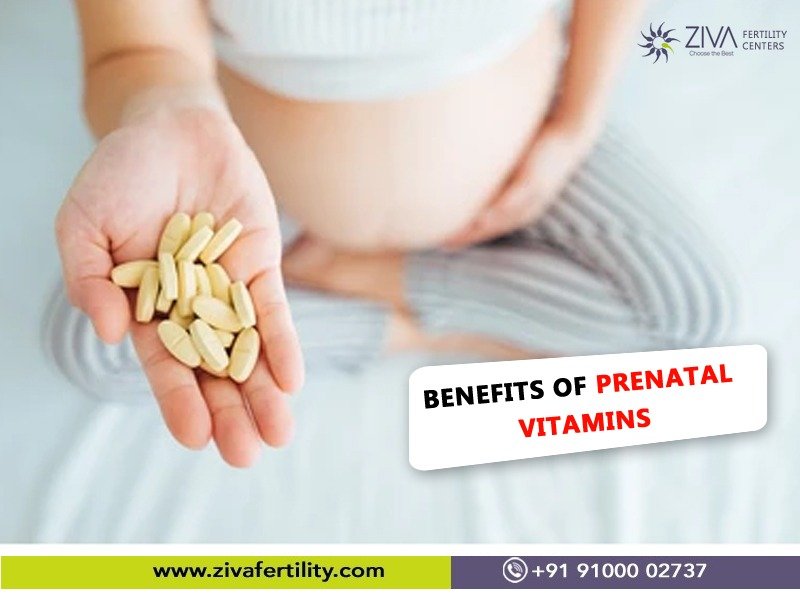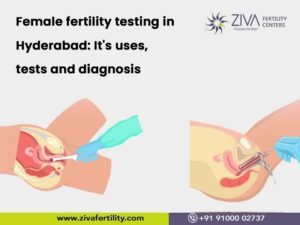Though nutrition is essential for women, the requirement is higher during pregnancy. The level of nutritious diet taken during the prenatal stage greatly affects the baby’s development and the mother’s health as well. During the prenatal stage, you must get the nutrients you need for a healthy pregnancy. This does not mean you keep eating since your diet must give you and your baby the necessary vitamins and minerals. At ZIVA Fertility centres, we ensure that expectant mothers take prenatal vitamins and get the nutrition they need. Ensuring women take prenatal vitamins is part and parcel of our treatment.
Why are Prenatal vitamins important? What are their benefits?

The right prenatal vitamin and mineral supplements not only help to maintain your health but also minimise certain risks for your child, such as:
Reduced risk of neural tube defects: During the early stages of pregnancy, get enough of the B vitamin folic acid. You can take them before you conceive, and they can greatly reduce your child’s risk of developing neural tube defects, such as spina bifida, i.e. cleft spine and anencephaly, i.e. improper development of the brain and bones of the skull. By taking folic acid before and at the start of pregnancy, the risk of being born with these defects is reduced by up to 70%.
Reduced birth defects: Folic acid also reduces the risk of being born with a cleft lip, a cleft palate, or certain heart birth defects.
Reduced risk of developing preeclampsia: Preeclampsia is a dangerous condition for the mother, characterised by high blood pressure, fluid retention, and excess protein in the urine. For the mother especially, taking sufficient folic acid during the early stages of pregnancy lowers the risk of developing preeclampsia. In severe cases of preeclampsia, if the blood pressure is extremely high, an emergency C-section may be required.
Helps prevent iron-deficiency anaemia: Women’s requirements for iron during pregnancy are higher and are approximately twice as much as before conception. Iron is required to make your and your baby’s haemoglobin (blood) during pregnancy. Iron also helps transport oxygen from your lungs to the baby’s body. So, taking daily prenatal vitamins and iron helps prevent iron deficiency anaemia, which can cause extreme fatigue and other symptoms.
Reduces the risk at the time of childbirth: Balanced consumption of prenatal vitamins reduces the chances of preterm delivery, low birth weight, and infant mortality. Iron deficiency anaemia is responsible for premature birth, low birth weight, and infant mortality.
Development of a healthy, strong baby: Women above the age of 19 years need 1,000 mg of calcium a day before, during, and after pregnancy. Calcium is required for the baby to develop strong teeth and bones, a healthy heart, nerves, and muscles, and normal heart rhythm and blood clotting. The mother also needs sufficient calcium to reduce the risk of preeclampsia and hypertension. If the mother does not have sufficient calcium intake, your developing baby will draw it from your bones, which can impair your health in the future. Prenatal vitamins will help meet your daily calcium requirement.
Reduces the risk of rickets: Rickets is a condition of the bones where they are weak and soft, caused by vitamin D deficiency. Fractures and deformities are common in these cases. Vitamin D is needed for the absorption of calcium and phosphorus. Vitamin D deficiency during pregnancy could lead to abnormal bone growth and delayed development in the child. Prenatal vitamins filled with vitamin D can prevent this. Studies have found that vitamin D deficiency during pregnancy can cause both preeclampsia and gestational diabetes.
Other benefits: Taking prenatal vitamins gives you the peace of mind of knowing that the mother and baby’s nutritional needs are met. Apart from taking prenatal vitamins, one should eat well during pregnancy with a healthy diet that includes meat, dairy products, vegetables, fruits, legumes, and grains. Eating a healthy diet and taking prenatal vitamins as prescribed by our caring fertility specialists at ZIVA Fertility clinics will ensure your child’s healthy development and your healthy pregnancy.
Which prenatal vitamins are the best?

Please ask your gynaecologist to prescribe the appropriate prenatal vitamins and the required dosage. They are easily available over the counter in nearly any pharmacy. You can consult your doctor for a specific brand, or the choice is up to you.
Do not just check for folic acid and iron; look for a prenatal vitamin that contains calcium and vitamin D. As an added advantage, look for a prenatal vitamin that contains vitamin C, vitamin A, vitamin E, B vitamins, zinc and iodine.
We at ZIVA Fertility Centre might suggest higher doses of certain nutrients based on individual cases. Also, be cautious not to take extra prenatal vitamins or multivitamins than you need daily.
What is the right time to start taking prenatal vitamins?
The best time is to start taking prenatal vitamins before conception. Women of reproductive age can regularly take a prenatal vitamin after consulting a doctor. The baby’s neural tube that connects the brain and spinal cord develops during the first month of pregnancy. So the earlier, the better since in some cases, women may not detect that they are pregnant. So it is advisable that if you are planning for a baby, start taking prenatal vitamins.
In some cases, prenatal vitamins could cause constipation. To overcome such problems, drink plenty of fluids and include fibre in your diet regularly. We at ZIVA Fertility Clinics give a lot of importance to prenatal vitamins. During your first visit, we will explain in detail about taking prenatal vitamins and assess if you need them. During your follow-up visit, we will also check your prenatal vitamin intake. For more information, please visit our website https://zivafertility.com/ or at +91-9100002737 or +91-9392834024.
















